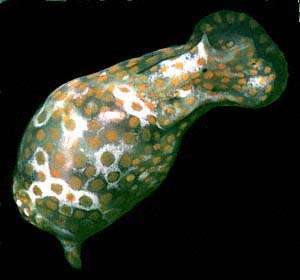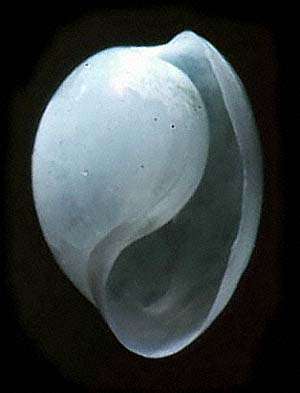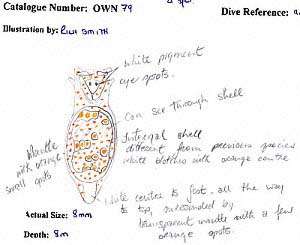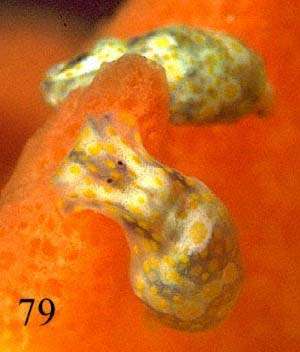

Haminoea sp. 2.
Order: CEPHALASPIDEA
Superfamily: HAMINOEOIDEA
Family: Haminoeidae
DISTRIBUTION
Tropical western Pacific?
PHOTO
UPPER: Guam, Bile Bay, 7m; 1 May 1970.
LOWER: Shell (4.0 x 2.7mm) of an animal 7.5mm long alive; Guam, Bile Bay, 14m; 19 May 1982. PHOTOS: Clay Carlson.
Another orange-spotted species of Haminoea.
"It still differs from H. cymbalum in terms of radula & gizzard plates. The radula is generally 5.1.5 with the inner edge of the first lateral denticulate. The gizzard plates are ridged with numerous chitinous rods. The average size for those measured is about 6mm." ... Note from Clay Carlson & Patty Jo Hoff. See message below.
Compare with other orange-spotted species:
Haminoea cymbalum,
Haminoea ovalis
Haminoea sp. 1.
Haminoea sp. 3.
See Carlson & Hoff's message discussing the 5 orange-spotted species.
Authorship detailsRudman, W.B., 1999 (March 26) Haminoea sp. 2. [In] Sea Slug Forum. Australian Museum, Sydney. Available from http://www.seaslugforum.net/find/hamisp2
Related messages
Sulawesi Haminoea not H. ovalis
March 26, 1999
From: C.Carlson & PJ Hoff


Bill,
After seeing the drawings from Lindsay Warren, I would like to change my identification of his animals. His '79' is our C.86 -- afraid it is just another Haminoea sp.. It also differs from H. cymbalum in terms of radula & gizzard plates. The radula
is generally 5.1.5 with the inner edge of the first lateral denticulate. The gizzard plates are ridged with numerous chitinous rods. The average size of the animal, for those measured, is about 6mm.
There are numerous haminoeid forms with orange spots, but only five that we now know of where this spotting seems to dominate the patterning. You now have 4 of the 5.
Clay & Patty Jo
Merizo,
Guam.
clay.carlson@kuentos.guam.net
Carlson, C. & Hoff, P.J., 1999 (Mar 26) Sulawesi Haminoea not H. ovalis. [Message in] Sea Slug Forum. Australian Museum, Sydney. Available from http://www.seaslugforum.net/find/719Thanks Clay & Patty Jo,
I'll certainly look at little orange spotted Haminoea more carefully in future. I am embarassed to say that looking back at my field notes there are some cases where I have written "no photo - typical colour pattern". I guess we've all fallen into that trap at times with some apparently easily identifiable group of species.
Bill Rudman.
Sketches of Haminoea #79 cymbalum?
March 22, 1999
From: Lindsay Warren

Dear Bill
Thanks for your email. The two lots of Haminoea weren't found on the soft coral featured in the shots. They were both found on dead branching coral which was covered in algae. Please find attached the sketches as requested.
All the best
Lindsay
100014.2112@compuserve.com
Warren, L., 1999 (Mar 22) Sketches of Haminoea #79 cymbalum?. [Message in] Sea Slug Forum. Australian Museum, Sydney. Available from http://www.seaslugforum.net/find/707
Dear Warren,
Thanks for the sketches. Clay Carlson & Patty Jo Hoff have just corrected my suggestion that your two animals are Haminoea cymbalum. They identify this as Haminoea ovalis. See their messages concerning Haminoea ovalis, Haminoea cymbalum (? = Haminoea simillima) and Haminoea sp. 1.
Best wishes,
Bill Rudman.
NOTE: Here is a repeat of the collection data and photo from Lindsay's original message which I have left with H. cymbalum: Tukang Besi Islands,
[Sulawesi, Indonesia - Operation Wallacea ] 1998. #79 - Length: 8 mm. Internal shell different from OWN78 with white blotches with
orange centre. Mantle with small orange spots. White centre to posterior foot from
shell to end of foot surrounded by transparent mantle with a few orange spots. They were found on dead branching coral which was covered in algae.
Haminoea ovalis another orange-spotted spec
March 21, 1999
From: Carlson & Hoff
Dear Bill,
As far as we know, Lindsay Warren's '79' is Haminoea ovalis Pease, 1868. As with '78' it differs from H. cymbalum in terms of color, shell shape, gizzard plates and radula.
Clay Carlson
Patty Jo Hoff
Merizo
Guam.
clay.carlson@kuentos.guam.net
Carlson, C. & Hoff, P.J., 1999 (Mar 21) Haminoea ovalis another orange-spotted spec. [Message in] Sea Slug Forum. Australian Museum, Sydney. Available from http://www.seaslugforum.net/find/710